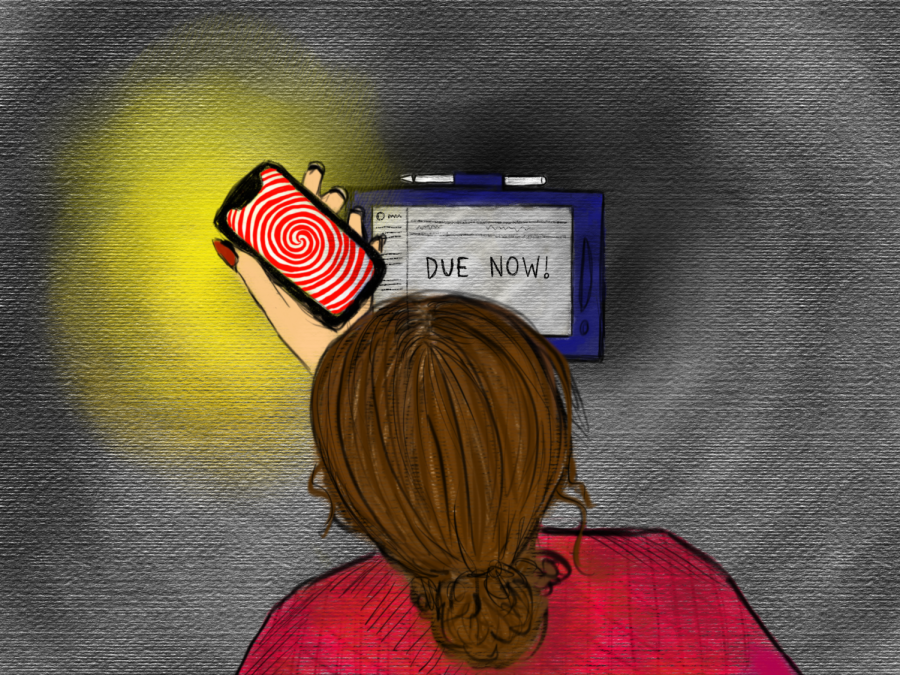Are our attention spans decreasing?
Exponential rise of short form media
Short form media is often the culprit of distractions, especially when it comes to school work. The Sidekick staff writer Anvita Bondada thinks that our learning habits have changed due to the everyday consumption of shorter media.
October 21, 2022
A student is trying to finish their homework as their phone buzzes with various notifications. They try to divert their focus away from the sound, but to no avail. They decide to take a break and scroll on their TikTok For you page for about 15 minutes. As they scroll, they check the time at the top of their screen.
6:00. 6:15. 6:30. 6:45. 7:00. They tell themself that they’ll start working in another 15 minutes.
The next day in class, they roll their eyes when their teacher instructs them to put their phone away.
They can’t bring themselves to pay attention in class so they sneak their phone out and watch even more TikTok under the desk, therefore missing the entire lesson.
They realize that they didn’t complete any work in class and decide to do it at home, just to get distracted and procrastinate again.
The cycle continues.
Sound familiar?
Short form media has taken over mine and many others’ lives, destroying our attention spans.
According to Hurrdat Marketing, short form media can be defined as content that is under 10 minutes or under 1000 words. Some examples of short form media could be TikToks or Instagram posts, whereas long term media requires more of your time and attention, through TV shows, movies and books. With the rise of platforms like TikTok, Instagram reels and YouTube Shorts, people have been looking away from their books and instead to their phones.
A study by Microsoft shows our attention spans have dropped from 12 seconds to eight seconds, a 25 percent decrease. This means a shorter attention span than that of a goldfish. We can clearly see the drop in attention spans of current teenagers. One way this can present itself is through procrastination and many students feeling their work ethic becoming weaker and their productivity levels decreasing.
“I often find myself not being able to concentrate while studying and I usually end up taking long breaks to scroll through social media,” Coppell High School sophomore Rudhmila Hoque said.
You might be asking how the attraction to short form media and decreasing attention spans correlate to each other. Decreasing attention spans can cause difficulty in reading a longer book or an hour long movie. Social media has taken the world by storm with its quick, straightforward nature and people don’t have to pay rapt attention and can just aimlessly scroll. Its rapid nature has captured the minds of teenagers and it has gradually taken our focus away with it.
Not only does the short and quick style of many social media platforms appeal to people, they also get easily addicted to it.
“Platforms such as TikTok are designed to keep your attention by giving you instant gratification when you are on it,” AP Psychology and Sociology teacher Kristia Leyendecker said.
This causes you to spend hours on it. The danger in platforms like these is that students quickly get used to short pieces of information being handed to them, rather than receiving the full context of something. This causes them to lose focus quickly as they aren’t accustomed to longer pieces of information anymore.
Students’ attention spans decreasing can also affect their performance in school. It has become increasingly difficult for students to sit through lectures and teachers have been adjusting to new teaching styles to accommodate this.
“I find that students can focus better when I provide interactive activities and ask them questions about the content,” Leyendecker said. “It helps stimulate them and they can grasp the material better.”
Short form media is not only affecting school work. Students in fine arts programs find themselves not being able to focus on their disciplines as well.
Fine arts such as band, choir and dance require large amounts of focus and attention to detail. Getting distracted during practicing is very detrimental to their skill.
“I can’t focus on choir as well as I used to in middle school,” Kantorei choir sophomore Monica Tupurani said. “I get annoyed when I have to sing something more than once and I find myself paying less attention to detail.”
Teenagers’ focus levels are going down at rates higher than ever before and they won’t stop decreasing as long as we consume short form media.
But how do we stop a problem if short form media has already overtaken our lives?
Follow Anvita Bondada (@anvita_bondada) and @CHSCampusNews on Twitter













Dr.Jhansi Katta • Oct 23, 2022 at 12:27 am
Yah, because of that effect, even I scrolled down ur topic unknowingly
Kameswara Rao Mylavarapu • Oct 22, 2022 at 7:32 pm
U have written apt item on short term social media. This term itself gives wonderful idea. The symptom studied by you is not only in teenagers but in people above 50 years also. Particularly professionals also unable to concentrate on their work well. The best way is to keep the phone switched off while reading and not carrying phone to school/college. Yes ofcourse communication may be a problem but we should use public communication incase of emergency.